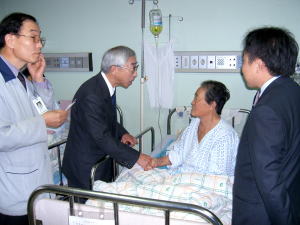Dispatch of Medical Professionals
Home > Dispatch of Medical Professionals > Dispatch List > HICARE Mission to Korea
HICARE Mission to Korea
HICARE dispatched a mission to Korea, including Dr. Dohy, President of HICARE, and three staff members. The purpose of the mission was:
・ To review medical training programs
・ To discuss more effective ways to invite medical personnel as trainees to Hiroshima
・ To conduct interviews to learn what activities HICARE trainee’s are conducting for Korean A-bomb survivors
・ To promote the establishment of a network for HICARE trainee’s in Korea.
Period:
Mission Members:
| Leader | Hiroo Dohy | President of HICARE, Director of the Hiroshima Red Cross Hospital & Atomic Bomb Survivors Hospital |
| Member | Koichi Wadasaki | Assistant Professor of the Radiology Department of the Graduate School of Biomedical Sciences of Hiroshima University |
| Member | Tokuo Kozono | Secretariat Staff in charge of inviting trainees from overseas |
| Member | Takashi Murasue | Secretariat Staff in charge of general affairs |
Hospitals/Institutes visited:
The Republic of Korea National Red Cross
Korea Institute of Radiological & Medical Sciences
Yeungnam University Medical Center
Keimyung University Dongsan Hospital
Pusan National university Hospital
Busan Veterans Hospital
Wallace Memorial Baptist Hospital
INJE University Busan Paik Hospital

President Dohy Seeing A-bomb Survivors at the Busan Veterans Hospital
Impressions:
During our stay in Korea, we visited the hospitals/institutes of trainees who had previously received instruction in Hiroshima. We introduced the recent activities of HICARE and conducted interviews with each director (or equivalent) and each trainee regarding the benefits of their training in Hiroshima and how it was currently being applied in Korea. Utilizing their opinions and suggestions, we would like to review and possibly revise our training program.
We were quite grateful to hear that every trainee regarded the training in Hiroshima as very valuable. Their impressions of the program will stay in our memories. Particularly, one impression deeply moved us:
Before they trained in Hiroshima, the doctors did not fully appreciate the fact that the patients they had been treating in Korea were victims of the Atomic bombing. However, once they arrived in Hiroshima, feeling the air of Hiroshima, learning the effects of Atomic bomb radiation on the human body, they began to realize the significant impact the experience must have had, both physically and mentally. This "actual feeling" greatly helped them to treat diseases related to the Atomic-bomb in Korea. Had it not been for their training in Hiroshima, they noted, they would have never understood the full significance of the Atomic bomb and its effects.
With each hospital/institute we visited, Dr. Dohy, president of HICARE, explained, "We do not believe there is a significant difference in standards of medical treatment between Korea and Japan. However, we sincerely hope that the trainees bring back to Korea not only a few new medical techniques, but also a previously unknown, fully comprehensive understanding of the A-bomb disaster."
It was the above anecdote from the trainees that made it clear to us: more than anything, HICARE’s facilitation of this new understanding, of the gravity of the A-bomb disaster, was a most valuable contribution.
Lastly, we would like to extend our appreciation and thanks to everyone involved, for the warm hospitality we received at every hospital/institution during our stay in Korea.



